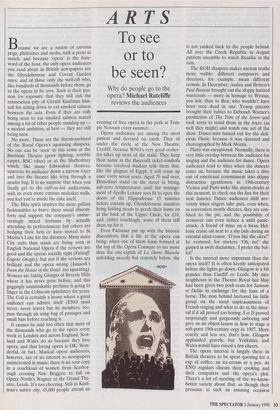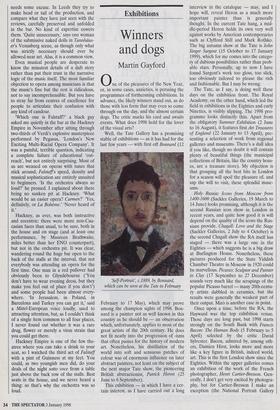ARTS
To see or to be seen?
Because we are a nation of envious prigs, philistines and snobs, with a press to match, and because 'opera' is the hate- word of the hour, the only opera audiences you read about in British newspapers are the Glyndebourne and Covent Garden ones; and of those only the well-off who, like hundreds of thousands before them, go to the opera to be seen. Such is their pas- sion for exposure that they will risk the remorseless pity of Gerald Kaufman him- self for sitting down to eat smoked salmon between the acts. Even if they are only being seen to eat smoked salmon seated among a lot of other people standing up a modest ambition, at best — they are still being seen. No more. These are the disenfranchised of the Royal Opera's agonising diaspora. No one can be 'seen' in this sense at the Barbican Theatre (poor lighting, terrible carpet, RSC vibes) or at the Shaftesbury which, like many Edwardian theatres, squeezes its audience down a narrow foyer and into the theatre like icing through a muslin bag. It is no surprise that when you finally get to the cafe-au-lait auditorium, with its even more curious moleskin walls, you feel you're inside the cake itself.
The Blitz spirit inspires the more gallant fashionables to brave these social discom- forts and support the company's embar- rassingly mixed fortunes by actually attending its performances; but others are hedging their bets or have moved to St Martin's Lane for the duration. Many more City suits than usual are being seen at English National Opera if the reviews are good and the operas socially right (Falstaff Eugene Onegin), but not if the reviews are brilliant and the opera wrong (Janacek's From the House of the Dead: too upsetting). Women are taking Giorgio of Beverly Hills where it has never gone before, and this gaggingly unmistakable perfume is going to linger in the Coliseum upholstery for years. The Coli is certainly a house where a great audience can admire itself (ENO must never, never leave) but its members, too, pass through an icing bag of passages and small bars before reaching it. It cannot be said too often that most of the thousands who go to the opera every week in London and across England, Scot- land and Wales do so because they love opera, and that loving opera is OK. Won- derful, in fact. Musical opera audiences, however, are of no interest to newspapers uninterested in music: there is no sour copy in a coachload of women from Scarbor- ough crossing New Briggate to fall on Opera North's Wagner at the Grand The- atre, Leeds. It's too cheering. Still in Kauf- man's native city, 45,000 people attend an evening of free opera in the park at Tem- ple Newsam every summer.
Opera audiences are among the most patient and devoted on earth. They sit under the circle at the New Theatre, Cardiff, because WNO's very good orches- tra takes up most of the stalls. They keep their name in the Bayreuth ticket-tombola because received wisdom tells them that, like the plagues of Egypt, it will come up once every seven years. Aged 70 and over, Bristolians stand on the street in biting, sub-zero temperatures until the manage- ment of Apollo Leisure sees fit to open the doors of the Hippodrome 15 minutes before curtain up; Glyndebourne standees bring folding stools to perch their bums on at the back of the Upper Circle, for £10, and, rather touchingly, some of them still dress up for it.
Even Parisians put up with the historic discomforts that a life at the opera can bring: when one of them leans forward at the top of the Opera Comique to see more than the one-eighth of La Dame Blanche unfolding sweetly but remotely below, she is not yanked back by the people behind. All over the Czech Republic in August patriots assemble to watch Rusalka in the rain.
The ROH diaspora makes ancient truths more visible: different composers and directors, for example, mean different crowds. In December, Auden and Britten's Paul Bunyan brought out the sloppy knitted waistcoats — more in homage to Wystan, you felt, than to Ben, who wouldn't have been seen dead in one. Young parents brought their babies to Deborah Warner's production of The Turn of the Screw and took turns to mind them in the foyer (as well they might) and watch one act of the show. Dance-nuts turned out for the deli- cious Platee, because it was directed and choreographed by Mark Morris.
Platee was exceptional. Normally, there is very little overlap between the audience for singing and the audience for dance. Opera audiences tend to titter when the dancers come on, because the music takes a dive out of emotional commitment into skippy distraction (gentlemen in 19th-century Vienna and Paris woke like alarm-clocks at this moment, to check out the line for their next liaison). Dance audiences shift ner- vously when singers take part, even when, as convention mostly dictates, they are con- fined to the pit; and the possibility of crossover can even induce a mild panic- attack. A friend of mine on a Swan Hel- lenic cruise sat next to a shy lady during an oriental salad course. 'D'you like the okra?' he ventured, for starters. 'Oh, no!' she gasped in swift disclaimer, 'I prefer the bal- let!'
Is the interval more important than the opera itself? It is often keenly anticipated before the lights go down. Glasgow is a bit grander than Cardiff or Leeds. My nice neighbours in the Theatre Royal last May had been given two posh seats for Samson et Dalila in exchange for the loan of a horse. The man behind hectored his little group on the nasal unpleasantness of French singing and what to do in the inter- val if it all proved too boring. Set D proved surprisingly and gorgeously unboring and gave us an object-lesson in how to stage a soft-porn 19th-century orgy in 1997. More cruelty and less sex, that's how. Glasgow applauded gravely, but Yorkshire and Wales would have raised a few cheers.
The opera interval is largely there in British theatres to be spent queuing for a cup of coffee, an ice-cream or a pee. At ENO regulars discuss their cooking and their computers and the opera's plot. There's a lot of snorting of the we-know- better variety about that, as though their presence at such an amusing occasion needs some excuse. In Leeds they try to make head or tail of the production, and compare what they have just seen with the reviews, carefully preserved and unfolded in the bar. No kind of expertise cowers them. 'Quite unnecessary,' says one woman of the submissive naked dolls in Tannhaus- er's Venusberg scene, as though only what was strictly necessary should ever be allowed near art. Alas, it is a common view.
Even musical people are desperate to know the minutest details of a daft story rather than put their trust in the narrative logic of the music itself. The most familiar objection to opera among musicians is that the music's fine but the rest is ridiculous, not to say incomprehensible. But you have to stray far from centres of excellence for people to articulate their confusion with any kind of candour.
`Which one is Falstaff?' a black guy asked me quietly in the bar at the Hackney Empire in November after sitting through two-thirds of Verdi's explosive masterpiece performed by Pegasus, `London's New Exciting Multi-Racial Opera Company'. It was a painful, terrible question, indicating a complete failure of educational 'out- reach', but not entirely surprising. Most of us are weaned on operas with tunes that stick around; Falstaff s speed, density and musical sophistication are entirely unsuited to beginners. 'Is the orchestra always so loud?' he pressed. I explained about there being no sunken pit at Hackney. 'What would be an easier opera? Carmen?' `Yes, definitely, or La Boheme."Never heard of it: Hackney, as ever, was both instructive and eccentric: there were more non-Cau- casian faces than usual, to be sure, both in the house and on stage (and at least one performance, by Maureen Brathwaite, miles better than her ENO counterpart), but not in the orchestra pit. It was clear, wandering round the huge bar open to the back of the stalls at the interval, that not everybody was attending an opera for the first time. One man in a red pullover had obviously been to Glyndebourne (`You don't have to wear evening dress, but they make you feel out of place if you don't') and some people had been almost every- where. 'In Jerusalem, in Poland, in Barcelona and Turkey you can get it,' said a Mittel-European voice loudly, used to attracting attention, but, as I couldn't think of a single item common to all four places, I never found out whether it was a rare drug, flower or merely a virus strain that you could get there.
Hackney Empire is one of the few the- atres where you can take a drink to your seat, so I watched the third act of Falstaff with a pint of Guinness at my feet. You could, as two youngish men did, do your deals of the night sotto voce from a table just above the back row of the stalls. Best seats in the house, and we never heard a thing: so that's why the orchestra was so loud.



















































 Previous page
Previous page